Have you ever pictured waking up to the gentle lapping of waves outside your window? Floating houses deliver breathtaking outlooks and a lifestyle like no other, yet they come with plenty of reality checks.
Before diving in, pause to weigh the joys against the potential headaches that might drift your way. First-time buyers often stumble into hidden fees, surprise repairs, and confusing loan deals. In this guide, we will break down the process, helping you choose wisely and avoid expensive blunders.
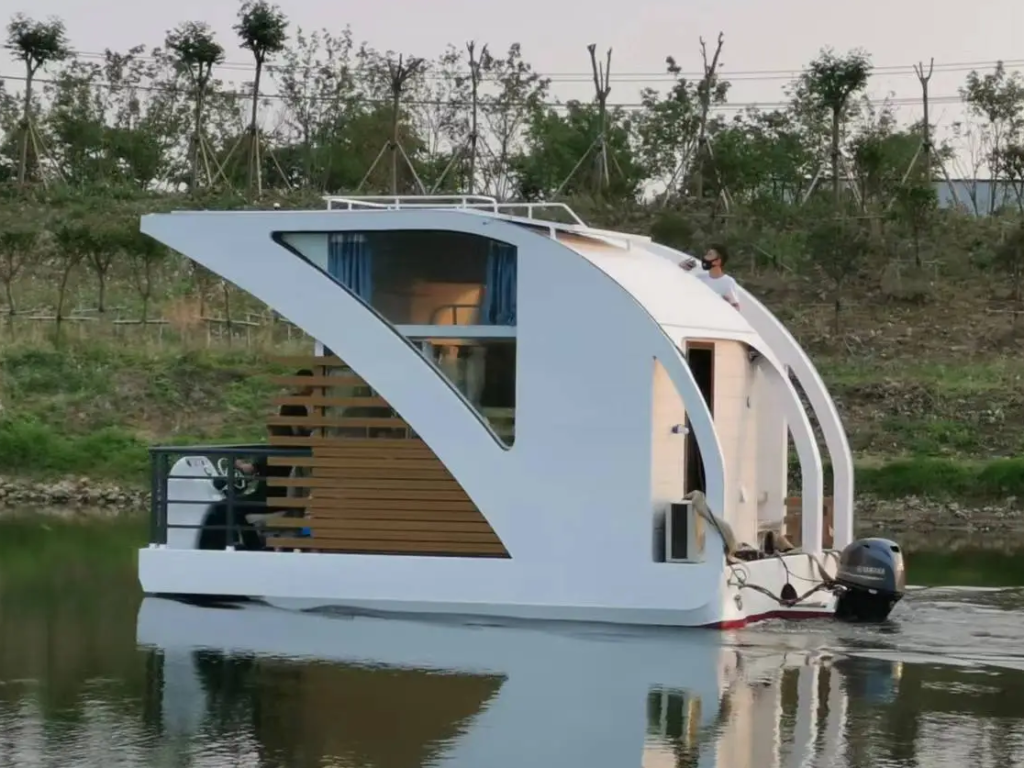
1) What Is a Float House?
A floating house is a house built on water instead of solid ground. Even so, it cannot move on its own. It carries no engine and no steering wheel. Instead, it remains anchored where it was built, much like any ordinary house planted on dry land.
You might be curious about how a floating home differs from a houseboat. A houseboat has a motor, so it can cruise around the water whenever the owner feels like it. A floating house, on the other hand, stays tied to one spot. Because of that, folks often purchase them just as they would a regular land home, with title paperwork and mortgage loans.
Now let’s discuss how these houses are built. Under each unit sit huge blocks called pontoons. Builders make them out of either concrete or tough foam. The pontoons let the home float and keep it steady on the water. Above the pontoons, crews use lightweight framing and panels that protect the house yet keep its balance.
But what about water, lights, and toilets? Don’t worry. Floating houses hook up to city pipes, power lines, and sewer mains just like land homes. Heavy ropes or sturdy poles hold each unit in place. So even if the river rises or falls, the house stays calm and steady.
2) Pros of Floating House
Floating homes are catching on in all kinds of places these days. Folks are drawn to the dreamy picture of sleeping on water, yet still having modern comforts. Yet life on a float is about more than pretty scenery- it also packs real, down-to-earth perks. So, if the idea intrigues you, here we will discuss the pros of floating hose:
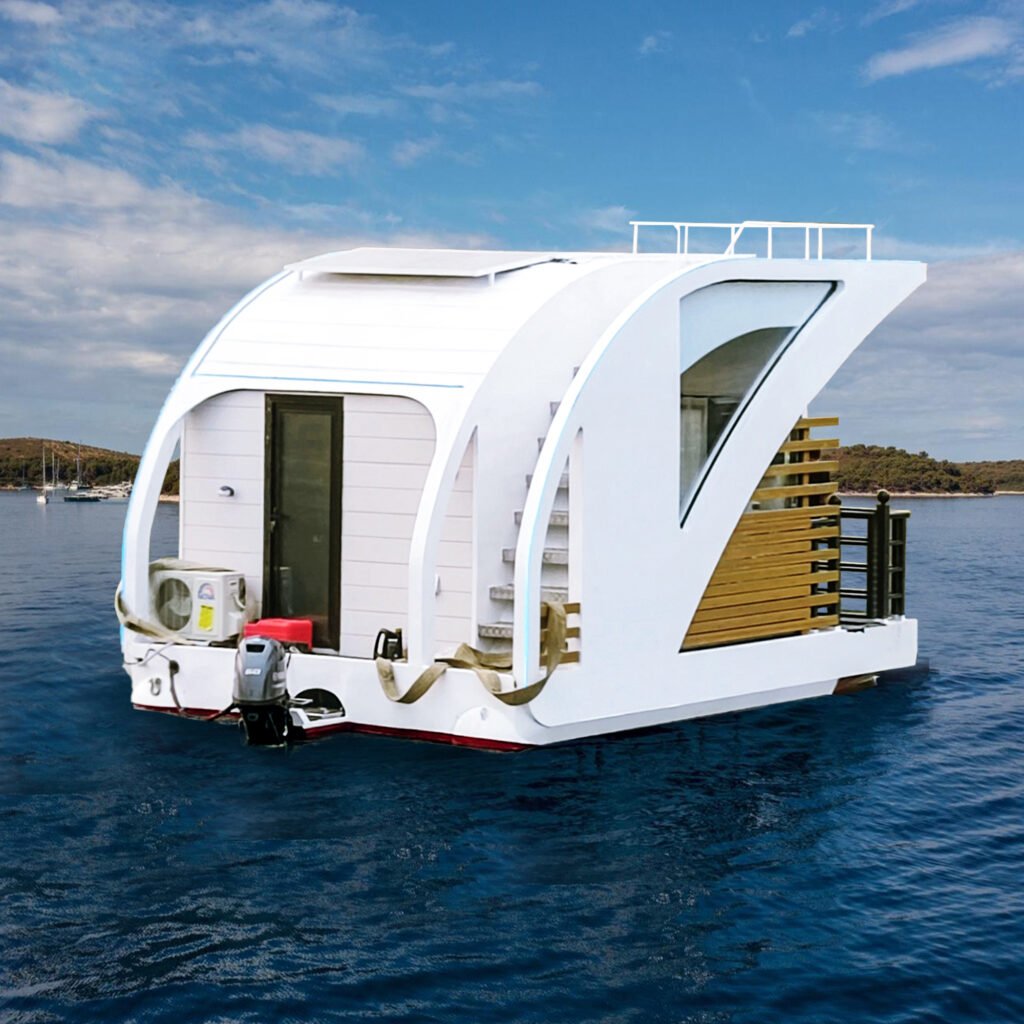
+ Lower Cost of Waterfront Ownership
Buying a home on the water usually costs a lot. For example, in many cities, a traditional waterfront house can top 1 million. By comparison, many floating houses start around 200,000 and run up to $500,000, depending on size and site. That gap lets buyers soak up the same view and laid-back life while spending noticeably less.
You usually pocket cash every year because the folks who set property taxes tend to hit floating houses with a lower bill than they charge for land-based waterfront places.
Depending on your zone, insurers may also offer cheaper coverage to owners of floating homes. Add it up, and you can enjoy life right on the water without draining your wallet.
+ Flexibility and Potential for Relocation
Floating houses give you real freedom. You aren’t nailed to a single spot. If the slip fees climb or the neighbors grumble, you can tow your home away. Simply hitch up and steer your buoyant life to another marina.
Now and then, folks simply crave a fresh outlook or a different circle of neighbors. When you live on a floating house, that wish is surprisingly simple to chase. Moving your home to another spot demands far less work than selling a grounded place and shopping for a fresh one.
Most floating houses rely on a modular layout. You can fit fresh sections as the years roll by. Perhaps you start with a roomy deck area. Later, a small guest cabin slides into place. If needed, you shift the mooring lines, too. All this keeps the house adaptable and hassle-free.
+ Sustainable and Environmentally-Friendly Lifestyle
Floating houses help the planet because they sit on water instead of on cleared land. By skipping the land-grabbing step, they leave trees, swamps, and wildlife intact. The result is a smaller overall scar on nature compared to typical ground-based homes.
On top of everything, you can sprinkle in green upgrades. Lots of homeowners put on solar panels; they catch sunlight and feed clean power back into the house. You can also build a simple rainwater tank, giving your family free water for chores and plants.
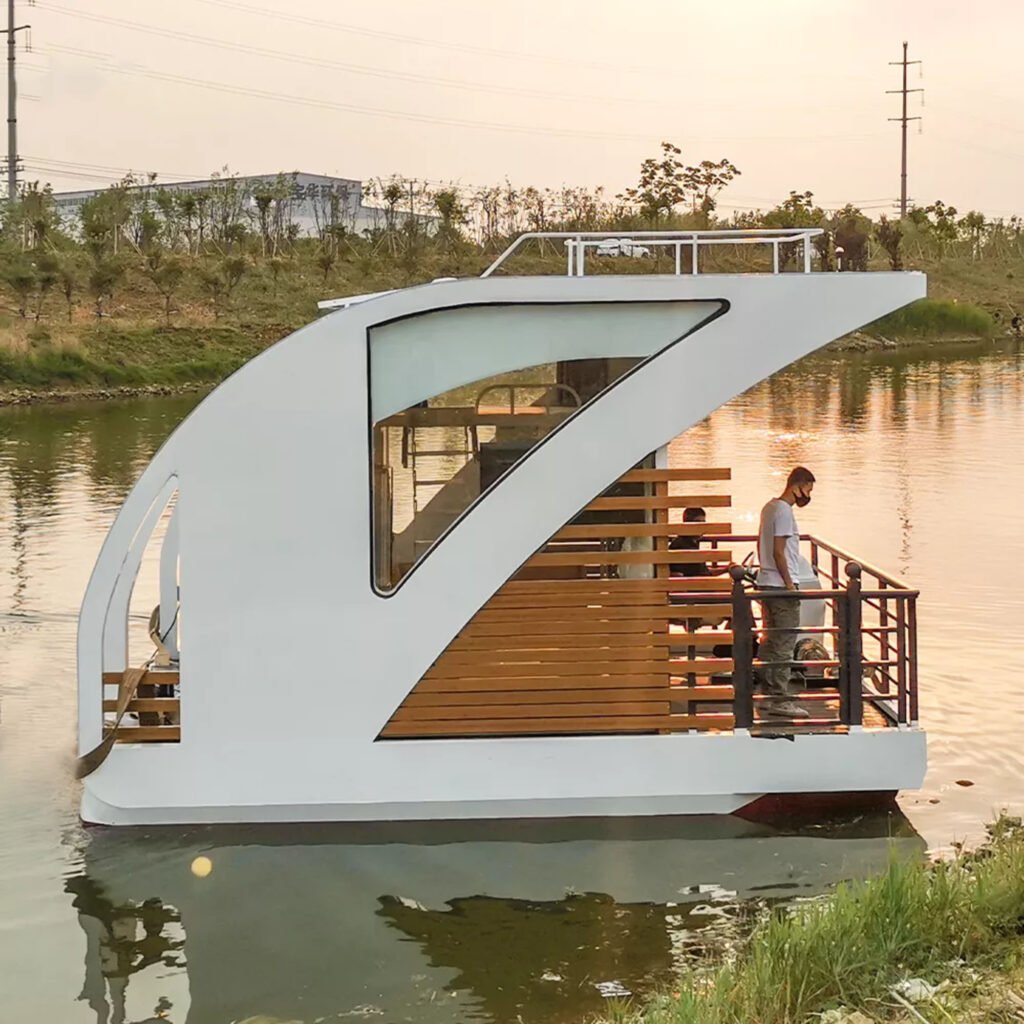
People who live on the water often use composting toilets in their floating homes. These low-flush systems save fresh water and cut down the amount of sewage. So, life on a floating house makes it easier to tread lightly on the planet.
+ Fast Return on Investment Opportunities
You might not guess it, but a floating house can actually turn a profit. Plenty of curious travelers now search for one-of-a-kind lodgings. As a result, floating homes are trending on every major rental platform.
You can post your house on Airbnb or Vrbo and see how it performs. Many waterfront rentals go for $200 to $500 each night.
Because floating homes cost less up front, you recover your cash faster. Strong demand keeps occupancy high, shrinking return time even further. It’s a clever investment route that lets you enjoy life on the water.
3) Cons of Floating House
Floating homes are dreamy and playful, no doubt. Still, life on water brings its own headaches. You need to weigh those before signing a purchase contract. So let’s discuss the downsides together.
– Moisture-Heavy Maintenance
Living on the water means constant moisture in the air. Humidity wraps around everything, and that can spell trouble over time.

Regular upkeep is simply part of the deal. You have to put anti-corrosion paint on all metal parts. You should also inspect the dock for wear after every storm. Mold is another concern. You need to check things regularly and wipe surfaces often. If you let up on cleaning, mildew spreads fast in a house that floats.
– Financing and Insurance Hurdles
Next, securing a loan for a floating house is often tricky. Many banks simply don’t finance them. So you will probably have to hunt down a lender willing to sign on.
Also, Insurance for a house on the water can get complicated. Not as many carriers will write a policy for a floating home. That often means extra forms and long wait times. On top of the hassle, premiums can creep up, too. Go in anticipating those extra hurdles and budget for them.
– Utility Complexity
Getting utilities hooked up is never straightforward. On dry ground, it moves quickly. Out at sea, the work grows complex and far pricier.
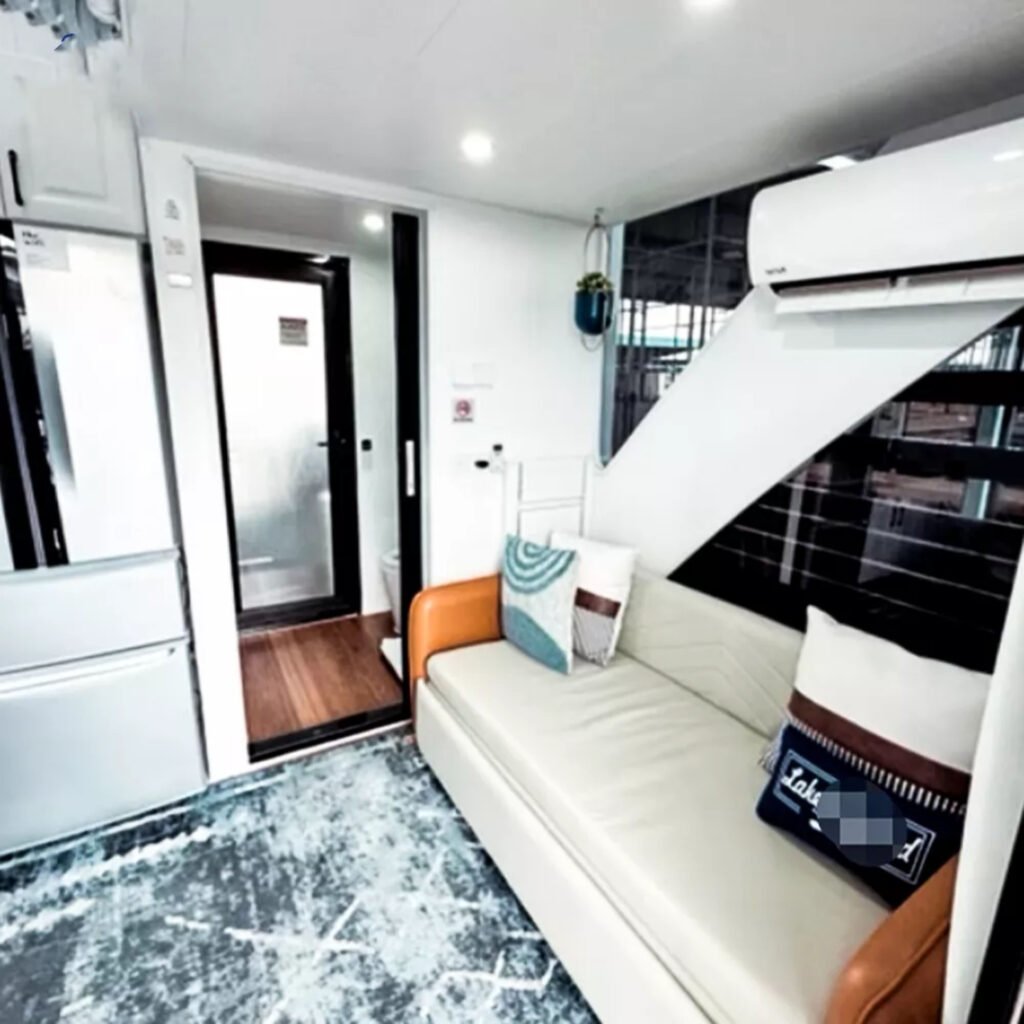
You need to lay sewer pipes, drinking-water lines, and power cables with real care. Every strand must meet tough industry standards. Skilled crews are then called in to build and check the grids. That labor- and its backup-quickly drives the budget up.
– Limited Moorage Availability
Finally, finding a place to park your floating home can be a real headache. The best slips are already spoken for. Most marinas keep long waitlists. Even after you land a space, the fees creep up year after year. When costs climb, hanging on to that slip becomes harder. You may have no choice but to pull out and search again.
4) Practical Checklist Before You Buy
Before you buy a floating house, there are some important things to check first. A little homework now can save headaches later.
i) Check Zoning and Moorage Rights
Before anything else, check that the marina actually permits floating homes. Take the time to confirm the local zoning laws. Many marinas restrict permanent living, so don’t assume you’re clear just because the dock looks busy.
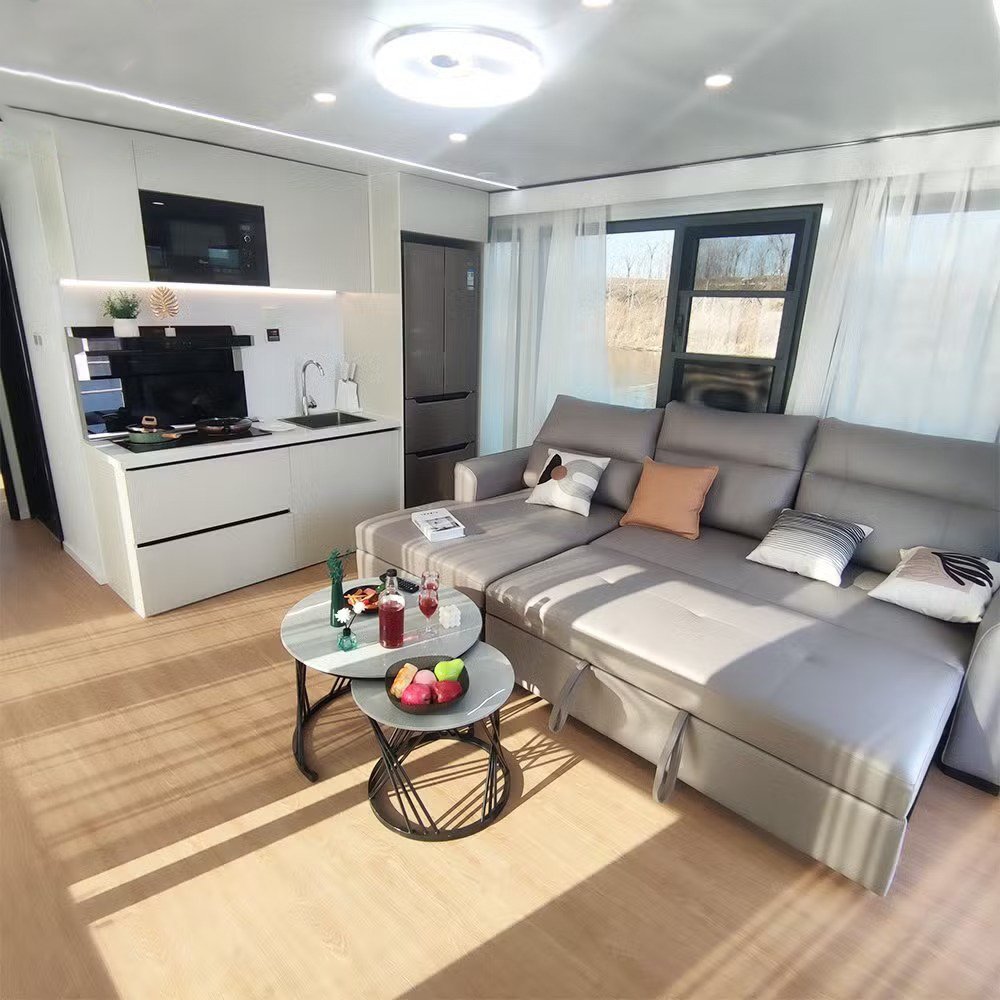
Before you commit, ask whether you can keep the slip for years. Long-term moorage rights are a must. If those rights aren’t guaranteed, you could be forced to relocate your boat far sooner than you thought.
ii) Get a Marine Surveyor
After that, bring in a marine surveyor. The specialist examines key systems around the floating house. They look at pontoons, anchors, lines, and all utility links. Findings reveal whether the craft is sound and seaworthy. A clean report spares you big bills down the road.
iii) Plan for Ongoing Costs
Living on a floating house brings everyday expenses you need to cover. It’s smart to keep a monthly budget for those costs. Budget for the marina’s annual slip fee, then add what it costs each time you haul your boat out for routine checks or a wash.
Set aside money for anti-fouling paint too, since that layer keeps the hull clear of algae, barnacles, and anything else that would slow you down.
You should also plan on paying more for insurance than you would for a house on dry ground. Being aware of that expense early lets you fit it into your budget without a last-minute scramble.
iv) Arrange Financing and Insurance
Finally, line up money as soon as you can. Loans for floating houses are a breed apart. Many banks simply won’t touch them. You might have to team up with a lender who really gets this niche.
Check early on that your policy protects you against flood and wind loss. Such hazards are baked-in realities for houses beside the water. Setting up solid coverage up front can spare you stress and money later.
→ FAQs
With decent upkeep, a solid floating house can easily ride out fifty years or even longer. Of course, how long it actually lasts still hinges on what materials you choose and how often you check for repairs.
ii) Are mooring and anchoring systems durable?
Mooring gear chains, ropes, and anchors usually hang on for fifteen to twenty-five years. How long it actually sits there depends on whether the water is fresh or salty and on the storms or calm the gear has to take.
Conclusion
In the end, floating houses pack real upside. First and foremost, they are affordable and eco-friendly. At the same time, living on the water brings its own headaches. Owners must deal with extra upkeep and tangled utilities. Securing financing and finding fair moorage can also prove tricky.
Even so, careful planning lets you enjoy life on the water without regret. When you weigh the ups and downs and tick off our quick list, a wise choice becomes clearer. At Space Capsule House, well-crafted floating homes give you the confidence to begin that adventure.


